
What is Game Development: Everything you need to know
Game development has never been easier... It is how this article might have opened if we were in the realm of "My Little Pony." In reality, taking a game from concept to worldwide recognition is a substantial and time-consuming endeavor. To achieve it, one must engage in extensive experimentation or follow a well-established plan crafted by experts.
Want to make a game that will win the hearts of players even better than Super Mario Bros or HOMM3? At Devoted Studios, we possess extensive knowledge of game development. In the following text, we aim to provide precise and comprehensive insights. This article will guide you through crafting a unique game from its inception, bringing you one step closer to releasing your game and earning a nomination for The Game Award.
So, let's goooo…
What Is Game Development?
In simple terms, game development refers to creating games from the ground up. It encompasses assembling the development team, progressing through each stage, and ultimately launching the finished game optimized for specific platforms like computers, mobile applications, and consoles. In the following sections, we will provide an in-depth overview of all the development stages you should be familiar with.
A game company or a third-party studio can undertake game development. However, regardless of your chosen approach, the pipeline and the key players remain consistent. It means that you need to have a comprehensive understanding of the development process.
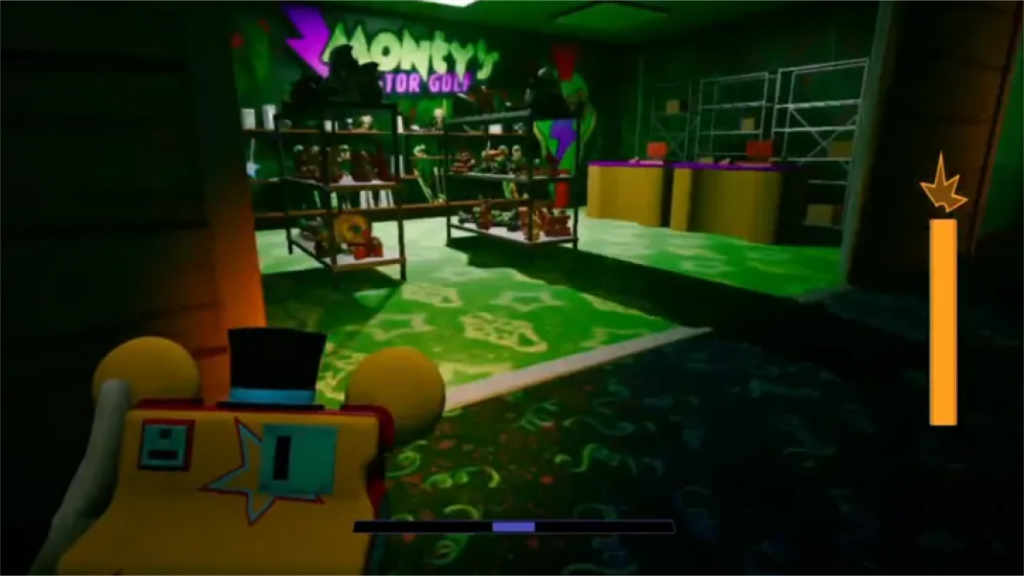
What Is Game Co-Development?
Co-development is a collaborative effort involving the primary studio responsible for game creation and one or more external companies that contribute to various aspects of development at different stages of the process. Collaborative development entails the synergy of other teams coming together to craft an exceptional final product. For example, Devoted Studios helped port the "Five Nights at Freddy's" Game to the Nintendo Switch – a great model where a third-party studio saves time and money for the game company and, at the same time, helps achieve the goal of increasing the number of players, their loyalty, and improving the company's image.
Frequently, co-development proves to be an advantageous arrangement, as external studios often bring broader experience in various facets of game development to the table. The high scalability and flexible nature of third-party studios may also drive the choice of co-development.
What are the Stages of Game Development?
Since game development is a vast and monumental process, it's essential to understand how to break it down into more miniature, manageable stages effectively. After all, as the saying goes, the better way to eat an elephant is to do it piece by piece.
1. Pre-production
It is the initial stage of game development, during which a significant amount of preparatory work occurs. The primary tasks addressed at this stage include:
- Formulating the game concept, defining the storyline, unique features, and gameplay elements that will set the game apart.
- Development plan preparation.
- Conducting preliminary research, gathering necessary resources, and budgeting for the project.
- Assembling the team - hiring key members, such as designers, artists, programmers, and sound engineers, and defining their roles and responsibilities.
Once you have your core team and have conducted essential research, it's vital to create a Game Design Documentation.
The Game Design Document (GDD)
Like a well-crafted movie or YouTube video, game development starts with a Game Design Documentation (GDD) script. The GDD should encompass:
- Concepts and illustrations that help visualize the core idea of the game.
- Design of all in-game characters, their interactions, and how they are presented.
- Open World design, describing the game's setting and environment.
- Game level design, detailing the structure of different game levels.
In addition, technical documentation is essential, which outlines:
- The game engine to be used.
- Development tools and platforms for the game creation.
It's important to note that your GDD doesn't need to be a perfectly finished product from the start. It can start as a basic concept and be expanded and refined during the subsequent development phases.
Prototyping
Once your Game Design Documentation (GDD) is developed to the MVP1 level, you can commence prototyping. This phase is part of the Production Milestone, which we will explore further below. During prototyping, you create a Vertical Slice encompassing the core game mechanics to evaluate the viability of your overall concept. This approach helps identify issues and prevent costly delays during development.
At this juncture, you'll encounter the first set of challenges and have the opportunity to refine your development process. Unfortunately, prototyping is a stringent "litmus test," and not all game ideas successfully pass this phase. If your concept withstands the test and proves viable, you can proceed to the Production stage.
2. Production
Production is the phase where the actual game development takes center stage. The preparatory work is behind, and the entire team actively engages in crafting a Minimum Viable Product (MVP1) of the game. It is a labor-intensive process, and during this stage, seven key elements are concurrently in progress. The speed and quality of the game depend on the collective effort of these components.
- Game Content Development: Game levels, characters, items, textures, and other in-game assets are created at this stage. Collaboration between artists, designers, and programmers is pivotal in generating all game elements.
- Programming: Programmers focus on coding to establish game functionality, encompassing game logic, artificial intelligence, physics, and other gameplay aspects.
- Sound Design: Sound engineers and designers work diligently on sound elements of the game, including music, sound effects, and character voice-overs.
- Testing and Debugging: Testers rigorously evaluate the game for bugs and issues, and developers subsequently address and rectify the identified problems.
- Integration and Optimization: All game elements are integrated into a unified project, followed by optimization to ensure compatibility with various gaming platforms and devices.
- Marketing and PR: An active marketing campaign commences during this stage, involving the creation of trailers, announcements, and promotional content to attract attention to the game.
- Meeting Deadlines and Budget: Project producers and managers ensure the game is developed within the established timelines and budget constraints.
Production milestones
We've previously discussed Production Milestones during the pre-production phase, which are crucial for organizing the concurrent work of various teams and transforming a chaotic set of tasks into a structured process.
- Alpha: During the Alpha phase, Project Managers define a set of features that will test the game's overall concept and performance. Expect some elements to be missing and a list of issues and bugs that will be passed to the optimization and bug-fixing stage.
- Beta: In the Beta stage, the core functionality of the game should be ready for testing by Quality Assurance (QA) teams and even a select community of players. This stage is vital for gathering valuable feedback from testers to further refine individual components.
- Gold Master: The Gold Master stage represents the final phase before the game's official release. At this point, the game is fully functional and prepared for its worldwide launch to players around the globe.
The production stage is one of the most intense and lengthy phases of game development. It ends with the release of a ready-made game for the public, but after that, support and updates begin to ensure the quality of the game and the satisfaction of the players.
3. Post-production
After the game's creation, the work is far from over. Post-production is a critical phase in game development, where the project is refined, prepared, and maintained for the long run. Here are some vital aspects of post-production in game development:
- Testing and Debugging: Comprehensive functional and regression testing occurs during this stage. QA teams and community specialists are vital in identifying major and other bugs developers must address.
- Game Polishing: This phase involves fine-tuning graphics, sound, and gameplay. It includes enhancing animation, textures, lighting, and sound effects to achieve a high level of quality.
- Optimization: The game undergoes optimization to ensure it runs smoothly and performs well on various platforms and devices, especially on less powerful hardware.
- Localization: For games intended for international markets, localization is performed. It includes translating the user interface, subtitles, and dialogues into different languages.
- Updates and Patches: Post-production doesn't conclude with the game's initial release. Developers continue to release updates and patches to address new issues, introduce fresh content, and enhance the overall gaming experience.
- Monitoring and Support: Developers closely monitor the game's performance and gather feedback from players. They provide ongoing support and technical assistance to address any issues that arise.
In reality, the journey from a game idea to players enjoying sleepless nights is an intricate process that follows the Game Development Pipeline. To maximize the potential of your vision, understanding this pipeline is crucial.
Game Development Pipeline
Like the game development stages, every game must progress through the pipeline. Consider the steps we've discussed above and imagine the multitude of tasks the team must complete to release a finished game on platforms like Steam or to attract the first million players.
Having a well-defined pipeline is essential as it ensures that all team members, from the community department to the company's Founders, have a clear understanding of the project's future.
The Concept Phase
This phase marks the productive work of UI/UX designers, project managers, game copywriters, and all those involved in the concept creation process. During this phase, numerous design layouts are generated, serving as the foundation for developers to create the core elements of the game. Ultimately, during the prototyping stage, the overall concept of the game and its features are evaluated for feasibility and effectiveness.
For example, here’s what the Epic Games concept of Soul: Cave looked like. Below, you can see how Game Assets are becoming a full-fledged gaming environment.
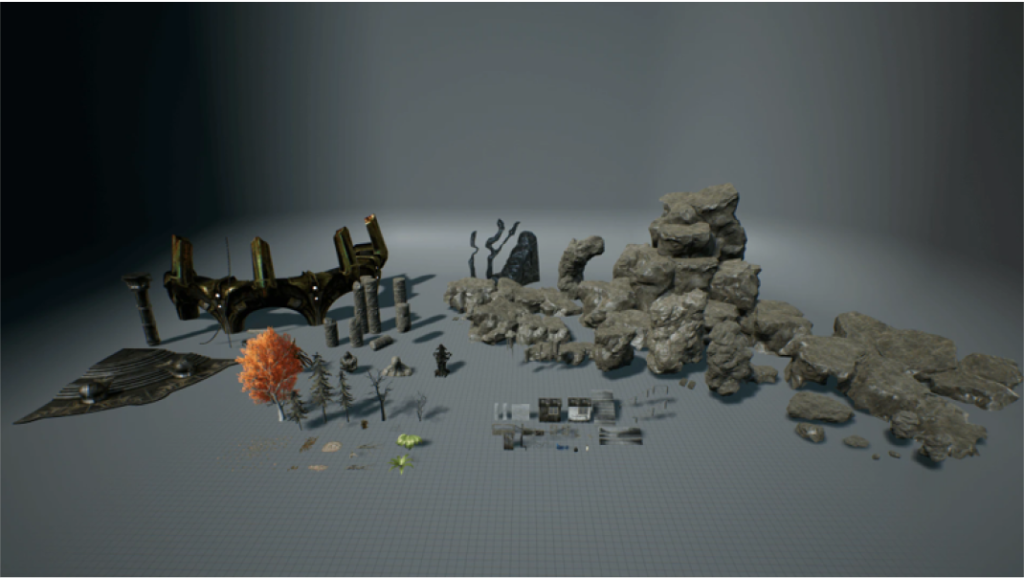
The Design Phase
Following the refinement of the concept, the game environment's planning and design phase commences. Game designers and developers collaborate, drawing upon their expertise to bring virtual designs to life. This stage also encompasses the creating characters, landscapes, rewards, and other in-game assets.
Upon completing this phase, you'll witness the remarkable transformation of your initial concept. Take, for example, the vibrant game asset "Soul: Cave" from Epic Games.
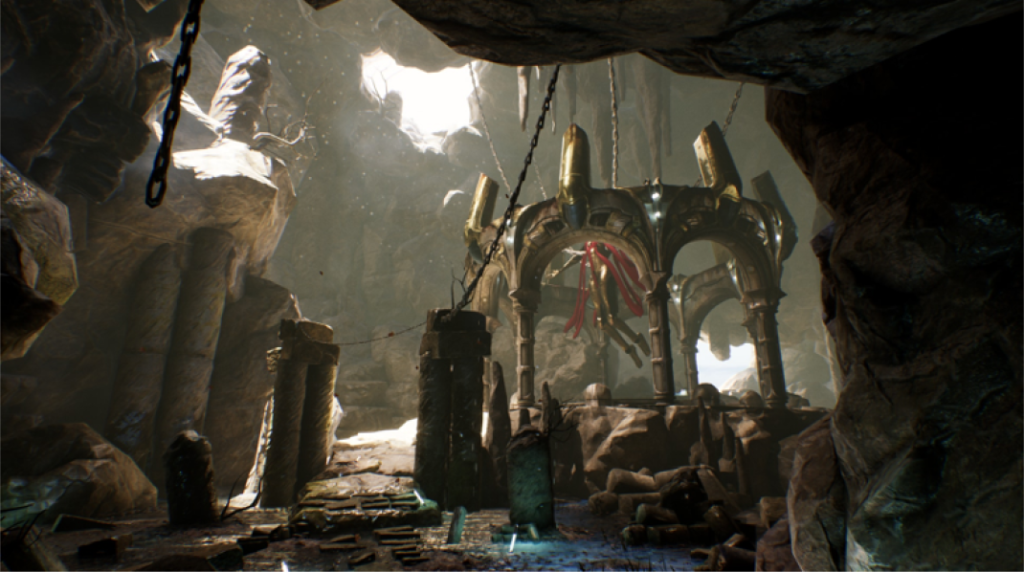
The Development Phase
In the development phase, your game comes to life. Game developers utilize code to bring the planned design to reality. You will begin to see a nearly finished version with a basic set of particular elements, including enhanced graphics and the initial setup of lighting and shadows.
This is exemplified in transforming the "Soul: Cave" asset after the Development Phase.
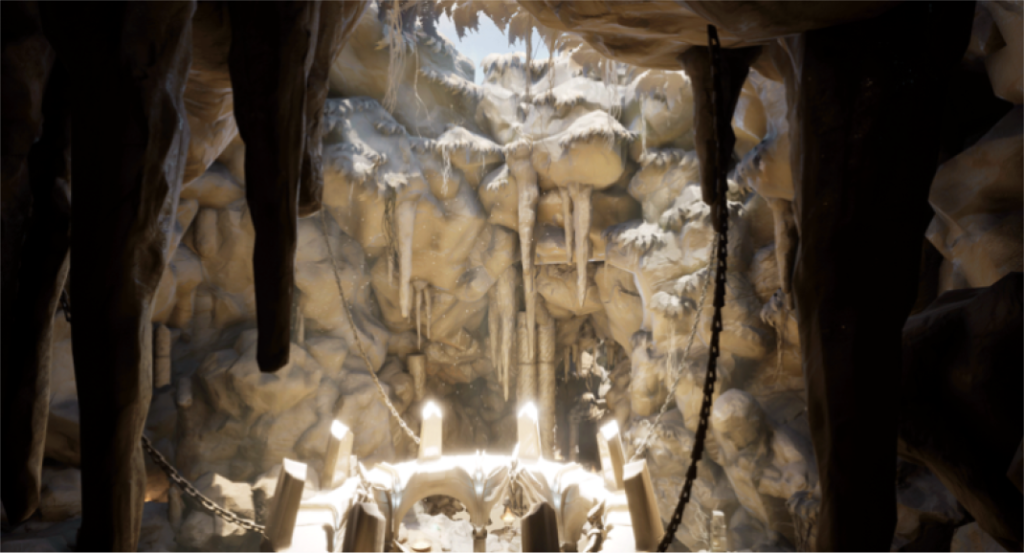
The Production Phase
In this phase, your game mechanics become more affluent, vibrant, smoother, and closer to a finished game. To illustrate, picture the addition of the sound of the wind, the calls of birds, and the footsteps of the protagonist to the animation described above. NPC characters are also introduced, allowing your player to interact with the Open World.
The outcome of the Production Phase is a game world that has been thoroughly beta-tested, featuring the required mechanics and gameplay elements.
Testing Phase
Now, the QA engineers, whose work previously went unnoticed, come into play. While developers and designers were busy creating concepts and animating 2D/3D models, game testers meticulously prepared test cases, checklists, and test plans.
Once the developers release the environment for testing, the QA team takes over, meticulously examining the game and identifying its most vulnerable areas. Here's an example of a bug in CS2 that might be overlooked (or left as an Easter egg) by the tester.
The testing phase typically occurs in multiple iterations - testers report issues to the developers and designers. After these issues are fixed, the QA team reevaluates the game thoroughly. This process is repeated until the developers resolve all the critical problems blocking the game's release.
The Launch Phase
If your game has reached the launch phase, your initial idea is on the right track. Now, your game is accessible to a broader audience of players. To make your game more widely known, the marketing department's efforts become more prominent. Marketers utilize social networks, collaborate with influencers, and leverage specialized platforms to advertise the game.
Now that we've familiarized ourselves with the primary stages of game development from the ground up, it's crucial to get acquainted with the individuals who oversee these processes – a team of professionals.
Key Game Development Roles
Let's delve deeper into the indispensable professionals vital for creating a contemporary game. The information provided below will assist you in not only strategizing for your future team but also in roughly estimating the budget.
Project manager (aka Game Producer)
A Game Producer functions as the conductor of the game development process, overseeing various aspects, much like an orchestra conductor manages a musical ensemble. Here are the primary responsibilities of a Game Producer:
- Meeting with Founders to discuss goals and current performance indicators
- Facilitating communication between all departments within the company.
- Creating roadmaps, documentation, and sprint planning.
In reality, the role of a Game Producer can be more extensive and varies based on the project's specific staffing. For instance, if the Project Manager (PM) is responsible for a particular feature, they may take on some functions related to testing or even design.
Below, we provide the most up-to-date Game Producer salary data (*valid as of October 2023.)
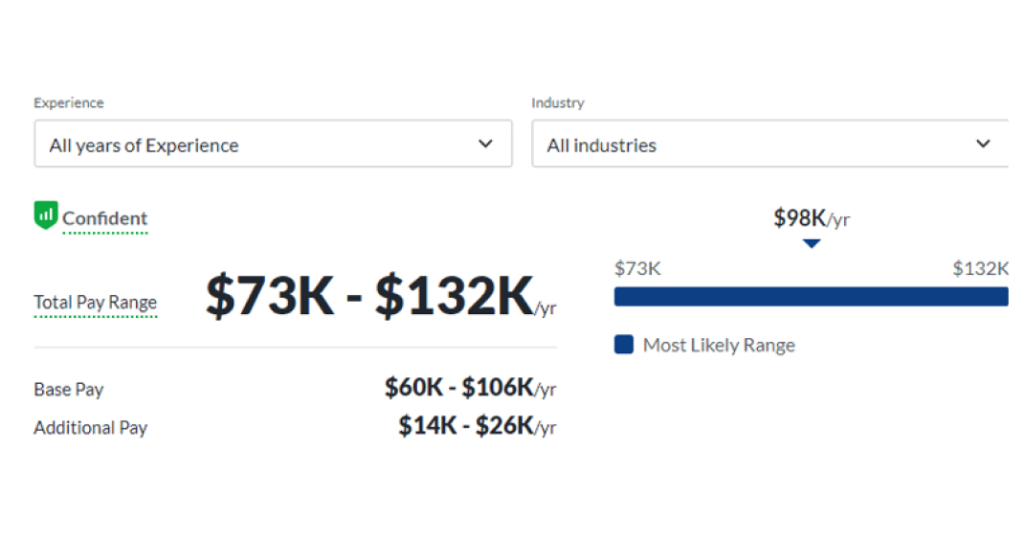
Game Developers
Game Developers are essential professionals in the creation of computer and mobile games. They are responsible for developing the game's code, which involves:
- Creating necessary game mechanics.
- Introducing elements of the game world and characters.
- Developing logic and interactions within the game.
- Implementing various systems required to execute critical game concepts.
- Addressing problems and gaps in sense when necessary.
The salary of a Game Developer depends on their grade, position, expertise, and any additional responsibilities, such as conducting interviews and training Trainee/Junior Game Developers.

Game Designers
Game Designers are the creative minds responsible for shaping the game's concept and logic. They are the visionaries behind ideas like battling dragons in Skyrim and implementing parkour in Assassin's Creed. Their primary tasks include:
- Introducing innovative gameplay elements to enhance player enjoyment.
- Defining and testing game mechanics.
- Crafting rules and objectives to maintain game balance.
Game Designers play a pivotal role in bringing unique and engaging gaming experiences to life.

Level Designers
Level Designers are specialists who operate within a specific domain, focusing on crafting balanced game levels. They are tasked with setting the stage, creating unique landscapes, and enhancing the player experience. Critical responsibilities of Level Designers include:
- Developing concepts for the game world.
- Establishing a balance between "difficulty" and "interest" to engage players effectively.
- Incorporating narrative elements to enrich the gaming experience.
Level Designers also actively participate in testing, ensuring that levels and gameplay meet the desired standards. Their role is crucial in tailoring the game experience to accommodate a diverse range of player skills, aiming for universal satisfaction.

Game Artists
Game Artists (GAs) are responsible for shaping the core visual elements of a game, making them one of the most vital contributors to a game's identity. The work of GAs extends to:
- Crafting memorable main characters, NPCs, and additional in-game personas.
- Designing captivating backgrounds and interfaces.
- Creating seamless and immersive graphics that enhance the player experience.
The quality of character design and the vividness of game environments rely on the skills and talent of Game Artists.
Salaries for GAs are typically determined based on their expertise and experience within the industry.
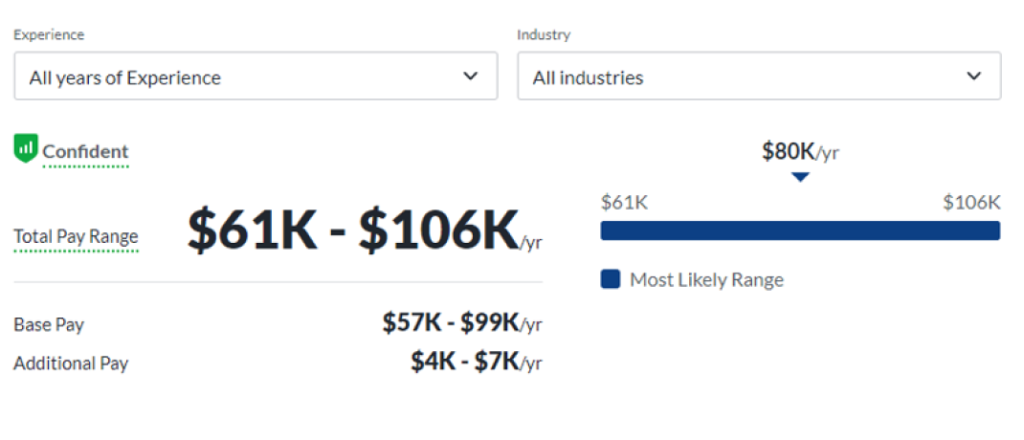
3D Modelers
All three-dimensional elements in a game are brought to life by 3D modelers. Houses, trees, and even pieces for character movements would only appear flat with the work of these professionals.
The salary of 3D modelers is influenced by their experience, the specific gaming genre they work on, and their proficiency with various 3D graphics platforms. Creating animations in programs like ZBrush, Maya, or Houdini can significantly boost their earning potential.

Game Animators
Game Animators not only create the outer appearance of characters but also design skeletons that allow protagonists and NPCs to move seamlessly, resembling natural human motion.
Furthermore, Game Animators play a crucial role in 3D animation and motion design. So, if you've ever witnessed a character opening a window or glass shattering after a gunshot in a game, you've seen the skill of the GAnimator.
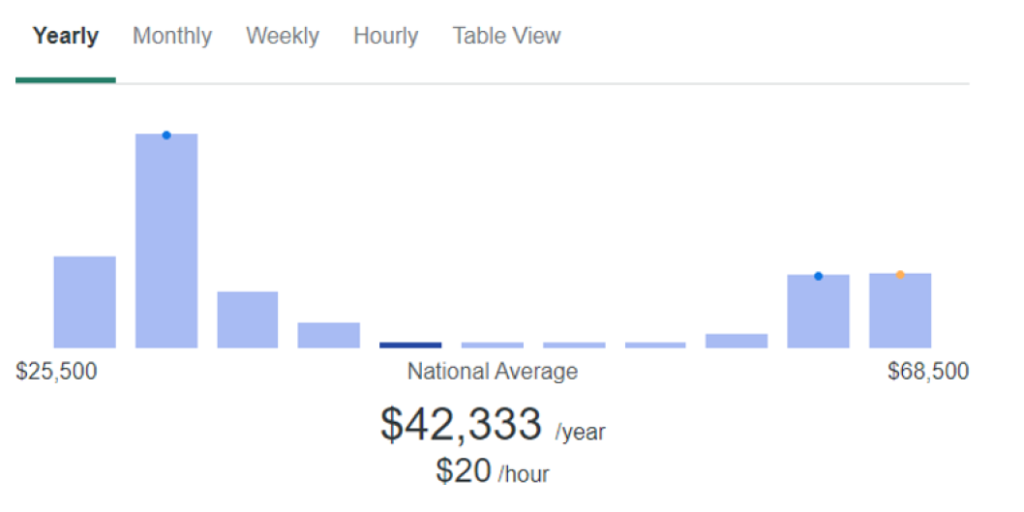
FX Artists
The FX Artist is a professional responsible for crafting special effects and creative visual elements. These highly skilled individuals are pivotal in delivering a dynamic and realistic gaming experience to your game. If your project involves explosions, gunfire, or other captivating special effects, an FX Artist is an indispensable part of your team.
The FX Artist collaborates closely with audio engineers, designers, and game testers. This collaborative effort is vital to creating a sense of presence and delivering an advanced user experience.

Audio Engineers
If you've ever played games like The Elder Scrolls or Red Dead Redemption 2, you're well aware of the crucial role that sound design plays. Audio Engineers are the masterminds behind the carefully crafted soundscape of a game.
Audio Engineers collaborate closely with developers, designers, and testers, and their responsibilities include:
- Recording and editing music.
- Creating sound effects.
- Sound editing.

Quality Assurance Engineer (Video Game Testers)
As mentioned earlier, the role of game testers comes into play even before the game reaches the alpha version. The QA team plays a pivotal role in shaping the game concept, often akin to 'Sieve of Socrates,' as they:
- Analyze the Game Design Documentation (GDD) to visualize gameplay to the maximum extent.
- Incorporate player feedback to align game development with player preferences.
QA Engineers are responsible for:
- Verifying game logic and gameplay.
- Creating comprehensive test documentation to streamline the verification process.
- Facilitating communication between developers, Sound Engineers, Game Producers, and Founders.
- Cross-checking problematic areas after bug fixes.
Some business owners may misconstrue the role of QA as merely letting players engage with the game until its release, opting for an extended beta test. However, in reality, QA's role is far-reaching and contributes to cultivating a more dedicated player base.

Additional Roles
In addition to the core team, there are other crucial experts you may require for your project:
- Community Manager: They actively engage with the gaming community, responding to player queries, organizing events and promotions, and gathering feedback to enhance the game.
- Monetization Specialist: These experts focus on developing and optimizing monetization models, including microtransactions and in-game advertising.
- VR Specialists: Proficient in virtual reality, these specialists work on creating games and applications for VR platforms.
- AR Specialists: Augmented reality specialists are responsible for developing AR games and applications.
- VR/AR Game Designer: Professionals in this role are dedicated to crafting unique gaming experiences tailored for VR and AR platforms.
- Artificial Intelligence (AI) Developer: AI developers specialize in creating the behaviors and solutions for artificial characters within the game.
- Blockchain Developer: If your project involves P2E NFT games, you'll need developers well-versed in creating smart contracts, writing code in the Solidity programming language, and possessing a deep understanding of blockchain technology.
Suppose you're embarking on establishing your game development company from the ground up. In that case, it's essential to estimate the time and budget required for your entire team to kick-start the development process. It is where we, Devoted Studios, come in to significantly reduce your development timeline by 2–3 times and potentially save up to 30% of your budget, all while delivering exceptional results.
We offer assistance in the following areas:
- Assembling a pre-assembled team with the necessary expertise tailored to your project.
- Accelerating the game development process.
- Porting an existing game to various platforms, including game consoles.
- Providing personalized guidance and solutions for more profound questions related to game creation.
Whether you seek advice or hands-on assistance with your project, we address all your queries and ensure you achieve your desired outcomes.
What is the history of game development?
While it might feel like we were playing GTA: Vice City or admiring the impressive graphics of Fifa 2005 just recently, the history of game development dates back to the 1970s. It was during this time that games like Space Invaders and Pong gained immense popularity.
The 1980s saw the emergence of more captivating computer games. Iconic titles such as Super Mario Bros and The Legend of Zelda debuted and even secured their spots in the Guinness TOP 50 games.
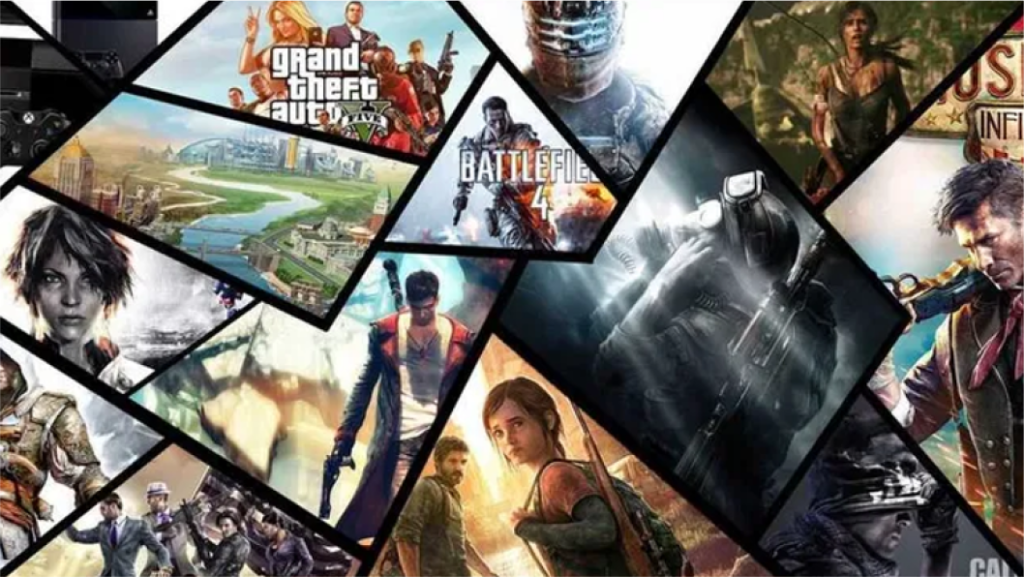
Moving into the 1990s, we witnessed the advent of 3D games, first-person shooters, and real-time strategy games. This decade introduced us to titles like Quake, StarCraft, Unreal Tournament, and Resident Evil.
As we entered the 2000s, online multiplayer games surged in popularity. Games like World of Warcraft, Lineage 2, and other MMORPGs took center stage. Over nearly a quarter of a century, the gaming industry has evolved far beyond mere entertainment. It has evolved into a fusion of art, technology, and mass culture, continuously offering players fresh and captivating worlds and opportunities.
Is Game Development Easy?
From the text above, you know that game development is a not-so-easy business. It requires a team of professionals, a well-defined game concept, an understanding of the target audience, and a substantial budget. The ever-evolving technologies and the ever-changing expectations of players further compound the intricacies of game development. Game creators must stay attuned to the latest trends and remain adaptable.
Despite the challenges, game development offers the unique opportunity to bring creative ideas to life, craft captivating worlds, and provide players with unforgettable experiences. Hence, while it is a demanding endeavor, it is equally exhilarating and rewarding for those willing to embrace the challenge.
To make this process more manageable, especially if you are just starting, consider contacting Devoted Studios or similar third-party studios with extensive experience in game development. They are ready to assist you in realizing your vision for the game you desire.
Forecast of Video Games revenue by segment in the World from 2017 to 2025
Take a look at the diagram presented by The World Economic Forum. It illustrates the increasing demand for video games each year, driven by players' preference to spend time on PC and game consoles.
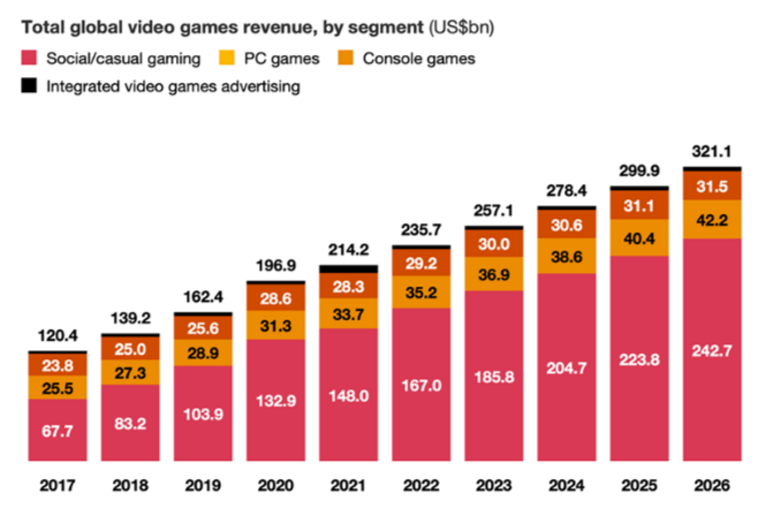
What does this diagram signify for individuals aspiring to create games? Game development is undeniably a highly lucrative sector. If you enter the market with a compelling idea, players will eagerly invest their money.
Are Games Developers in Demand?
Now, let's turn our attention to another chart that illustrates the continuously growing number of employees in the GameDev industry.
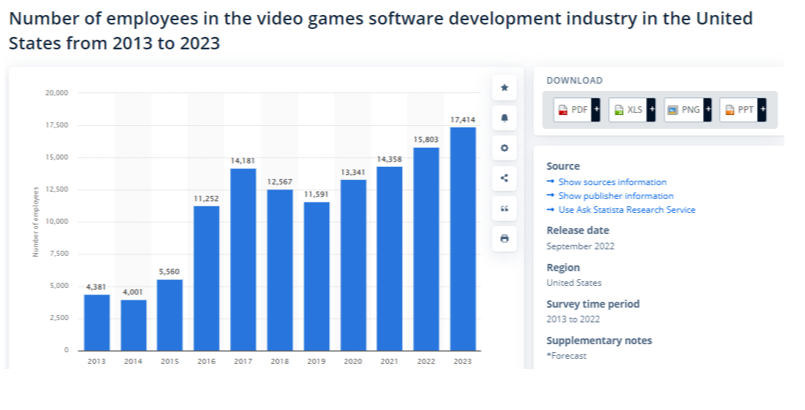
This graph proves that game development has become an up-and-coming and popular field. These statistics aren't mere words; they are derived from surveys and data from millions of individuals.
What does it take to be a Game Developer?
Becoming a Game Developer without any effort is not a feasible endeavor. If you're fortunate enough to have a higher education in Game Development, that's a plus. However, if you lack formal education, you must be willing to learn the essentials of this profession. The following are the most crucial skills you need:
- Technical Skills: You should possess a solid understanding of at least one programming language, such as C++, C#, Java, or Python. Additionally, you should be proficient in working with game engines like Unreal Engine, Unity, or similar platforms.
- Soft Skills: Effective communication, time management, handling substantial data, and teamwork are essential soft skills in this profession.
Hands-on experience in game development and staying updated with industry trends is a significant advantage. With these skills and experiences, you have the potential to earn a yearly salary of approximately $67,000 while collaborating with a team to create exceptional gaming projects.
Is Gaming a Good Career?
One of the previous sections highlighted over 10 of the most popular professions in the Game industry. As the industry continues to grow and evolve, it demands an increasing number of new professionals. It presents an excellent opportunity to pursue a promising career with high earning potential.
To determine if a future in Game Development is the right choice for you, take a closer look at the salaries associated with the professions we discussed earlier. Compare these figures to your current salary and then project them three or more years into the future. If the potential in Game Development appears more promising than your current work, you might have found the answer to your career question.
Do you need a portfolio for Game Development?
Undoubtedly, your portfolio is crucial in securing interviews and career opportunities in the GameDev industry. While it might appear as an expansive and unfamiliar field, well-known figures are easily recognized. Prominent developers can find themselves approached by recruiters and talent seekers.
If you're a newcomer to the industry and don't possess an extensive portfolio, it's essential to be realistic. The competition is fierce, and individuals with strong portfolios have an advantage.
However, don't be discouraged. If you're determined to become a Game Developer, there are various ways to learn. You can take online courses or follow game development tutorials on platforms like YouTube to gain insights into the logic and responsibilities that developers handle daily. Collaborating with friends or like-minded individuals on non-profit projects, either in person or through online communities, is another great way to gain experience and build your portfolio.
What should be in a Games Development Portfolio?
Indeed, here are the essential elements that a game developer's portfolio should contain:
- Good Game Examples: Showcase the projects you've worked on, whether independently or as part of a team. Include a variety of genres and styles to demonstrate your versatility.
- Code and Scripts: If you're a programmer, provide code samples used in your projects to showcase your technical expertise.
- Documentation and Project Descriptions: Offer explanations of your work, detailing the project's purpose, development process, and your specific roles in it.
Remember that your portfolio should be well-organized and easy to navigate so potential employers can quickly assess your skills and potential.
Game developers salary
In our earlier discussions, we delved into the salaries and responsibilities of developers. We discovered the strong demand for game developers and the rapid growth of the gaming industry. Moreover, the game development profession not only fosters professional growth but also offers substantial income potential. As you accumulate more experience and become increasingly sought after, you gain the leverage to negotiate for higher salaries.
Is Third Level Education necessary to be a game developer?
Providing an unequivocal answer to this question is unlikely because, in practice, the game industry isn't concerned with whether you're attending a university, taking online courses, or lacking a formal degree. What holds utmost importance is possessing a robust portfolio, comprehending the company's responsibilities, being proactive, and wanting to advance in this field.
With these attributes, not even a few rejections from companies will deter you from your journey to becoming a game developer.
What are Game Engines?
There are over five popular game engines that developers can utilize to create various types of games. Some of the most renowned game engines include:
- Unity: Unity is among the most widely used and cost-effective game engines. It's suitable for developing both 2D and 3D games and offers support for multiple platforms, including mobile devices, PCs, and consoles.
- Unreal Engine: Developed by Epic Games, it is celebrated for its exceptional graphics capabilities, making it ideal for crafting high-quality 3D games. It also offers free access to its source code.
- Godot: Godot is a free and open-source game engine that accommodates both 2D and 3D game development. It empowers developers to create games across various platforms.
- CryEngine: Known for its remarkable graphics and physics capabilities, CryEngine is frequently employed in crafting realistic games with stunning visuals.
- Lumberyard: Developed by Amazon, Lumberyard provides a suite of tools for game development and multiplayer online projects.
How to choose the right game engine?
The choice of a game engine hinges on the specific project requirements and the developer's level of expertise. There are six steps to choosing the right GE for your Game Development:
Game Type: Different engines are tailored to specific game types. For instance, Unity is well-suited for 2D and 3D games, while Unreal Engine is renowned for its 3D capabilities. Select an engine that aligns with your game's genre and structure.
Supported Platforms: Ensure that the engine you choose supports your target platforms. If you intend to develop games for mobile devices, opt for an engine with robust mobile support.
Graphics and Sound: Consider the engine's graphics and sound capabilities. If you require stunning visuals, opt for an engine that excels in graphics.
Community and Documentation: Having a supportive community and high-quality documentation can significantly facilitate the development process. Ensure your chosen engine boasts an active community and offers readily available training materials.
Budget: Some engines are free, while others entail royalty fees. Consider your budget and select an engine that aligns with your financial resources.
Developer Experience: If you have prior experience with a particular engine, it can influence your choice, as familiarity can enhance your productivity and confidence in your work.
So what are the best languages to learn for game development?
The best programming language for game development depends on various factors, including the type of game, the target platform, and your skill set. Here are some popular options:
C++: This language is an industry standard and is widely used in many games due to its high-performance capabilities.
C#: Ideal for game development on platforms like Unity, as it provides convenient tools for developers.
Java: Commonly employed in the development of mobile games, particularly on the Android platform.
Python: Well-suited for creating prototypes, scripting, and developing games with a strong narrative focus.
JavaScript: Suitable for web-based games and those built with HTML5.
Can you learn Game Development without code?
Yes, it is possible to develop games today without extensive programming skills. Let's take a closer look at four tools and engines that are available that enable game creation, even if you aren't a seasoned programmer. Some examples of such platforms include:
Unity: Unity offers visual tools and pre-made components, making it possible to create games without writing code entirely from scratch.
Unreal Engine: Unreal Engine also provides visual development tools, such as Blueprints, which allow game creation without extensive programming knowledge.
GameSalad: This tool is specifically designed for creating mobile games without the necessity for coding.
RPG Maker: Geared towards developing role-playing games and is accessible to developers with limited or no programming experience.
While these tools simplify game development, understanding programming logic and concepts can be beneficial. Consequently, creating games without extensive coding is an excellent option for individuals looking to venture into the game development industry despite having limited programming skills.
What is a Games Design Document?
Game design documents are fundamental to video game development and encompass various types of documentation, each playing a unique role in the game creation process. These include:
- Concept Design: This document outlines the overall game idea, encompassing its storyline, ambiance, characters, and core gameplay mechanics. It forms the foundation of the entire project.
- Level Design: This documentation provides an in-depth description of the game's level structures, the placement of objects, objectives, and gameplay elements. It is crucial for crafting each specific level.
- Character Documentation: Here, details about characters' traits, behavior, dialogues, abilities, and background stories are documented. This information aids artists and programmers in character creation.
- Balancing and Testing: This type of documentation concentrates on game balance, as well as testing and debugging procedures. It ensures the creation of a balanced and engaging gaming experience.
- Interface and User Experience: This segment defines interface components, including menus, controls, instructions, and other aspects to ensure player convenience.
Each of these documents holds significance in game design and contributes to the cohesive and efficient development of video games.
How do you prototype complex games?
Creating a prototype for complex games is essential for defining the core mechanics and concept of the game before embarking on full-scale development. Here are steps to guide you in building a successful prototype:
- Define Objectives: Begin by establishing the objectives your prototype should accomplish. It can involve testing new mechanics, presenting the game concept to potential investors, or validating an idea.
- Select the Tools: Choose the appropriate tools for crafting your prototype. These can range from specialized game development programs like Unity or Unreal Engine to more straightforward materials like paper and pencils for a paper prototype.
- Focus on Key Elements: Concentrate on the fundamental mechanics and core elements of the game within your prototype. Avoid delving into intricate details and prioritize showcasing what makes your game unique.
- Test and Iterate: After crafting the prototype, subject it to testing by your target audience. Their feedback will be invaluable in refining and iterating the prototype towards its ideal version.
- Prepare for Development: A successful prototype is the foundation for further game development. At this point, you can confidently proceed to create a full version, knowing that the concept has been tested and validated.
Creating a prototype for complex games stands as a pivotal stage in the development process. It not only helps in averting potential mistakes but also ensures that the chosen concept is on the right path.
List of Tools Used for Game Development?
Each of the Game Development specialists operates within a specific environment and relies on essential tools for their work. Here are the three most crucial practical components without which normal development operations would be severely hindered (please note that game engines are excluded from this discussion, as we've previously discussed them):
- Visual Studio: Visual Studio is a comprehensive development environment for creating game code. It provides developers with the necessary tools and features to write, edit, and manage their code effectively.
- Trello (Linear or Jira): Trello is a precious project management tool that aids developers in task tracking and deadline management. Its intuitive interface and collaborative features make it an indispensable resource for maintaining project organization.
- GitHub: GitHub offers a robust platform for code version management and project collaboration. It enables developers to handle code repositories efficiently, collaborate with team members, and manage various aspects of the development process.
What specific skills do you need for Game Development?
Within GameDev, each player has a crucial role, and collectively, they transform ideas into fully realized games, taking them from conception to the Gold Master stage. Here are the fundamental skills required to become a valuable part of a GameDev team:
- Programming: Proficiency in programming languages like C++, C#, and Python, and expertise in utilizing game engines to craft functional games.
- Game Design: Comprehensive understanding of game mechanics, game balance, and player experience, including the ability to devise captivating narratives and design engaging game levels.
- Graphics and Animation: Competency in graphic editing, 3D modeling, and animation to infuse games with visual appeal.
- Sound: The capability to create and seamlessly integrate sound effects, music, and dialogue into the game world.
- Project Management: Proficiency in planning, budgeting, and team management to meet development timelines and financial constraints.
- Marketing and Analytics: Insight into the gaming market, adeptness in monetizing games, and the ability to analyze user data.
- Testing and Debugging: Proficiency in detecting and resolving game issues, enhancing the overall gaming experience.
- Creativity and Communication: The aptitude for generating innovative concepts and effective interaction with fellow team members.
Depending on the specific role, individuals may need advanced skills, such as programming artificial intelligence, creating character animations, modeling, and more.
2D vs 3D
The choice between 2D and 3D graphics in game development hinges on your game's concept and objectives. Here are some considerations to assist you in making this decision:
2D Graphics:
- Simplicity: Creating 2D graphics is generally more straightforward and demands fewer resources.
- Retro Style: It can impart a quaint ambiance to your game, appealing to a specific audience.
- Cost-Efficiency: If you're working with budget constraints, 2D development can be a more economical choice.
3D Graphics:
- Realism: 3D graphics enable the creation of realistic worlds that offer a deeper level of immersion.
- Freedom: They provide significant creative space for crafting diverse characters and expansive game worlds.
- Advanced Features: If your game centers around modern technology and effects, 3D graphics may be more suitable.
It's vital to note that the choice between 2D and 3D graphics doesn't imply that one is superior. For instance, consider the iconic game Worms – even in 2D format, it delivered excitement and intrigue. However, its transition to 3D format, unfortunately, failed to meet expectations.
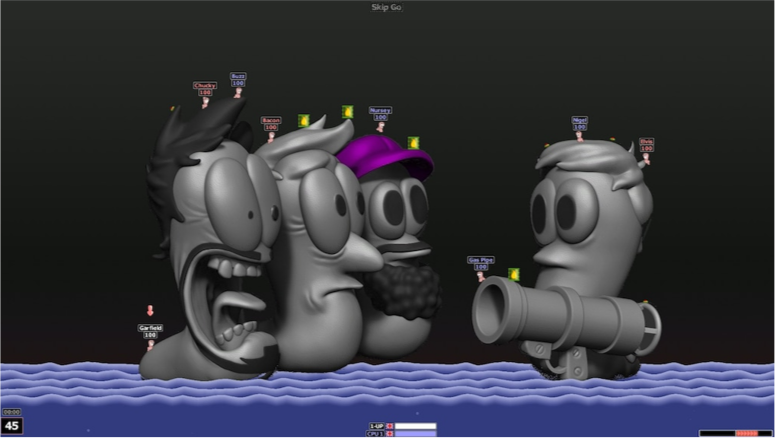
Game Development vs Software Development
The critical distinction between game development and software development lies in their scope and focus.
Game development is a specialized field that centers on creating the design, mechanics, and content of video games for player interaction. It encompasses tasks like designing game levels, characters, and objectives, crafting storylines and narratives, establishing artistic styles and visual themes, and more.
Software development encompasses a broader spectrum, including programming, software architecture, application development, web development, and various other software-related domains.
Thus, it is essential to recognize this difference if you are passionate about game development and aspire to craft exceptional games for a global audience to enjoy.
Game Development vs App Development
Game Development and App Development are two distinct domains within the field of information technology, each characterized by its unique features. The fact that mobile applications are a broader concept, and therefore, App Development should be considered a wider sphere. In turn, the Game App is only a game that can be run on a smartphone.
Beta testing vs Soft Launch, are they mutually exclusive?
Beta testing and soft launch are two distinct methods for testing and improving a product, whether a game or software. The choice between them depends on the specific objectives and context of the development process.
Beta testing is a procedure in which a limited number of users, often from external sources, gain early access to the product before its official launch. The primary goal of beta testing is to identify and rectify bugs and errors and collect feedback from a diverse range of users. This feedback aids developers in making the necessary improvements before the product's wide release.
Soft launch involves gradually introducing the product to the market with limited resources and audience. The primary aim here is to assess product performance, monetization strategies, and its adaptation to specific demands. Soft launches are typically conducted in smaller regions or among a restricted audience.
It's worth noting that these two methods can complement each other based on the project's goals. For instance, beta testing may precede a soft launch to ensure a high-quality product before a smooth market introduction. Ultimately, the decision to choose between beta testing and soft launch depends on the specific strategy and requirements of the project.
What are the different types of game genres?
The world of video games encompasses various genres, each offering a unique gaming experience and atmosphere. Here are some of the most common game genres:
Action: This genre is characterized by high dynamics, combat, shooting, and physical challenges. It includes games like shooters, fighters, and platformers.
Role-playing games (RPG): RPG games allow players to engage in character development, decision-making, and interaction in intricate storylines.
Adventure: This genre focuses on storytelling, puzzles, and game world exploration.
Strategies: Strategy games include real-time strategy (RTS) and turn-based strategy games where players develop tactics and build bases.
Simulators: Simulators allow players to experience various aspects of real life, whether managing a farm, driving a car, or running a city.
Sports Games: Sports simulators offer competitions in various sports, such as football, basketball, and tennis.
Horror: The horror genre challenges players to survive in dark and frightening scenarios.
Online Multiplayer Games (MMO): MMO games enable players to interact and compete in large-scale virtual worlds.
Racing: In racing games, players can compete in different types of vehicles.
These are just a few examples, and within each genre, there are numerous subgenres and hybrid forms that contribute to the richness and diversity of the gaming world.
Other Game Development Terms
Let's explore some specialized terms that are relevant to GameDev. You're likely to encounter these terms primarily during the game development process:
- AAA Game: This is an extensive game produced by large gaming companies. These games typically have high budgets and are expected to meet top-tier quality standards.
- Ray Tracing: This is a rendering technique that simulates the behavior of light, enhancing the visual realism of in-game graphics.
- Terrain: In the context of gaming, terrain refers to the landscape and geographical features of the game world.
You'll indeed come across a vast array of terminology, whether you're a developer or a founder, as you navigate the world of game development.
Final Words on Game Development
The article above is a comprehensive guide covering everything you need about game development. By the end of the article, you will learn about:
- Game Development Stages and Pipelines
- Insights into the key professionals in the GameDev field and their respective salaries
- Answers to various questions crucial for working in GameDev, spanning positions from developer to company CEO.
Stay tuned for the latest updates from Devoted Studios, as there is a lot of exciting and valuable content coming your way in the GameDev sphere.